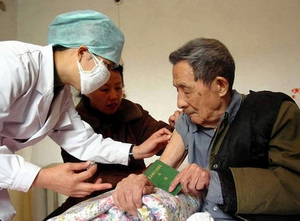(Ecns.cn) -- Preliminary opinions of Shanghai's health care reform were first made public on May 17, according to a Friday report in China Youth Online, during which a period of public notice introduced the family doctor concept to local residents.
On May 23, the first signing ceremony of family doctors was held in Shanghai's Xuhui District. From then on, residents in five communities, including Kangjian, Xietu, Fenglin, Xujiahui and Hongmei, have been able to enjoy the services of a family medicine system – a rare thing in China, where the sick usually go to large hospitals for treatment.
So far, the results have been positive, although Shanghai's fledgling family doctor system is overwhelmingly used by the elderly. More steps must be taken to sway the city's younger population away from the big hospitals.
Family doctors offer personalized care
When patients go to a hospital in China, the first step is deciding which department to register in.
But as is often the case with health problems, establishing the cause is not so cut and dry. For example, a stomachache may be caused by a variety of problems, from indigestion to hyperthyroidism, requiring a patient to register at different departments for several tests before a doctor can make the correct diagnosis.
The family doctor method seeks to redress such inconvenience and expense by making the doctor/patient relationship more personal.
The concept is nothing new to some communities in Xuhui District, where residents were introduced to a similar system five years ago, albeit under a different name: doctors were called "household registered" doctors, instead.
Feng Jie began her career as a household registered doctor early in 2008. At that time, each neighborhood committee was allocated with a physician, and residents could walk to the community health service station within minutes.
Many of the local elderly signed contracts with the doctors during treatment. Often, patients established good relationships with their doctors – who they probably already knew well – and mutual trust was gradually built between them.
There are many other doctors just like Feng Jie, who go deep into nearby communities, nurturing good relationships with residents and maintaining close familiarity with their health conditions.
Feng Jie is now head of the Wannan Group, short for Wannan Community Health Service Station. After three years of experience, the health service station now serves 1,440 households comprised of 3,761 people.
"Family doctors are the doctors we know very well, because we have always gone to them in the past. The difference is only their title, from household registered doctor, to family doctor," said an elderly person surnamed Xu.
More qualified doctors needed
"Whenever I feel uncomfortable I can call the family doctor. The elderly can also ask them to drop in, to take their blood pressure or for guidance about medicine. I think their service is excellent, and we have developed a mutual trust," said Ms Wang, who lives in the Fenglin Community.
But there are those who doubt the effectiveness of the family doctors.
"If my relatives are ill, can family doctors make a correct diagnosis in time?" enquired Miss Zhang, who lives in the Xietu Community. Her question is a common one among the public, many of whom prefer big hospitals, even for minor ailments.
"People love big brands. Sometimes we are also swayed from tertiary hospitals to the family doctors, but we are not sure," said Mr Li, from the Hongmei Community.
Many young people often have second thoughts before seeing a family doctor. Though the signing rate is about 93% in the Fenglin Community, which is a solid foundation for the family doctor system, there is still a need to improve the doctors' medical skills and attract more young people.
"There is a shortage of excellent general doctors. Because the age structure of the communities is usually elderly, it limits the development of the family doctor system to some extent," said Liu Shiqiang, head of the Xuhui District Health Bureau.
To tackle the problem, Shanghai plans to train 500 general doctors every year in the future, but the family medical system still needs more support to attract qualified doctors. As such, the Xietu Community has designed a mutual support platform for family doctors in order to ensure that they receive equal benefit compared to the public medical system.
Family doctors will also be judged by their patients. Those who do not get enough positive feedback will have to undergo more training.


















